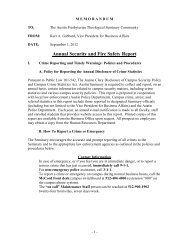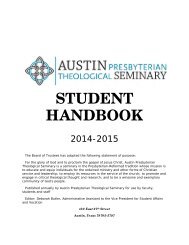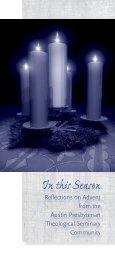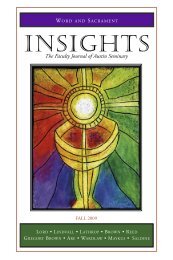Catalogue 2008 Book - Austin Presbyterian Theological Seminary
Catalogue 2008 Book - Austin Presbyterian Theological Seminary
Catalogue 2008 Book - Austin Presbyterian Theological Seminary
Create successful ePaper yourself
Turn your PDF publications into a flip-book with our unique Google optimized e-Paper software.
THE PRACTICE OF MINISTRY<br />
evangelism, stewardship, church administration, ministry with the elderly,<br />
institutional chaplaincy, campus ministry, social action and service, pastoral care,<br />
worship, children’s work, and youth ministry. The opportunity to take part in such<br />
elective supervised practice of ministry must be arranged in advance through the<br />
Offi ce of Supervised Practice of Ministry. Ordinarily students are permitted to register<br />
for no more than six credits of elective SPM in any given fall, January, or spring term.<br />
Students wishing to earn Supervised Practice of Ministry credit must participate<br />
in SPM orientation, which is conducted prior to the beginning of each fall term,<br />
and must work out the plan of study in conversation with the director of SPM. All<br />
projected supervised practice of ministry placements are subject to the approval of<br />
the SPM director and the academic dean.<br />
ALTERNATIVE SETTINGS FOR MINISTRY: OUTPATIENT REHABILITATION<br />
PROGRAM FOR CHEMICAL DEPENDENCY<br />
Students enrolled in this course learn about addiction and the twelve-step recovery<br />
process of Alcoholics Anonymous by means of required reading and lectures. They<br />
also explore the dynamics of chemical dependency with a medical professional, a<br />
family therapist and a spiritual director, and with persons affected by the disease.<br />
Students prepare a fi nal project in which they refl ect theologically upon their learning<br />
experience. Six credits.. January<br />
CLINICAL PASTORAL EDUCATION<br />
<strong>Austin</strong> <strong>Seminary</strong>, through various clinical settings, offers clinical pastoral education<br />
as a part of its program of study. In this specialized program, students clarify<br />
and increase their understanding of the resources, methods, and meaning of the<br />
Christian faith as expressed in pastoral care and develop skills critical for the practice<br />
of ministry. This educational experience is clinical in setting and interdisciplinary<br />
in character, and is conducted under the supervision of a certifi ed clinical pastoral<br />
educator. Clinical pastoral education is ordinarily taken during the middler or<br />
senior year for a period of at least ten weeks in the summer, but also may be taken<br />
concurrently with other course work. Twelve credits are awarded for a basic unit of<br />
clinical pastoral education. Ordinarily, clinical pastoral education cannot be used<br />
to meet the supervised practice of ministry requirement.<br />
Opportunities for clinical pastoral education are available in centers accredited<br />
by the Association for Clinical Pastoral Education. The Southwest offers a variety<br />
of training centers in general hospitals, mental health institutions, and local<br />
congregations. Information is available through the Offi ce of Supervised Practice<br />
of Ministry. Arrangements for clinical pastoral education are initiated through the<br />
SPM offi ce in conversation with the SPM director.<br />
PASTORAL CARE IN A HOSPITAL SETTING I<br />
This seminar introduces the student to pastoral care in a hospital setting through<br />
practice of ministry, group verbatim conferences, individual supervisory conferences,<br />
and written evaluations of student performance and growth. Particular attention is<br />
focused on church ordinances, theological concepts, and biblical interpretation as<br />
resources for pastoral care. Prerequisite: second year standing. Six credits. January<br />
PASTORAL CARE IN A HOSPITAL SETTING II<br />
In this course students gain experience in hospital visitation and in practical training<br />
for ethical issues arising in health care, and actively contribute as members of the<br />
72










